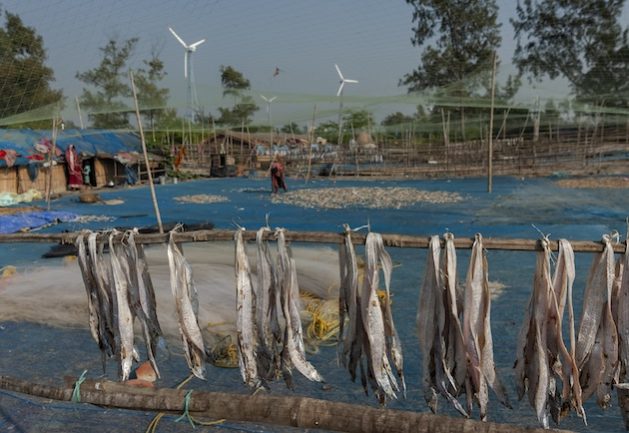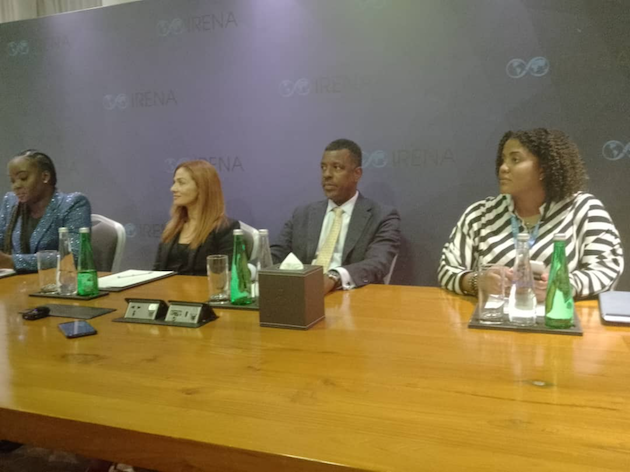Small Island States Fostering Effective Energy Transition To Achieve a Blue Economy

ABU DHABI, Apr 24 (IPS) - Small Island Developing States (SIDS), a distinct group of 39 states and 18 associate members, are making efforts to promote the blue economy as they possess enormous potential for renewable energy relying on the sea.
Experts predict that switching to renewables will help SIDS countries decarbonize power generation as an appropriate option for islands to cut their carbon dioxide (CO2) emissions, fulfill Paris Agreement pledges and contribute to the global fight against climate change.
In addition, ocean energy technologies, according to the International Renewable Energy Agency (IRENA), are likely to offer high predictability, making them suitable to provide a continuous supply of power.
Dr Vince Henderson, Minister of Foreign Affairs, International Business, Trade, and Energy, Dominican Republic, told IPS that the key has been prioritizing the development of various forms of renewable energies, focusing on clean and efficient energy exploration and exploitation.
While SIDS have shown climate leadership through 100 percent renewable energy ambitions, experts believe that realizing these ambitions is critical.
“Renewable energy innovations are a winning formula for our blue economy's development," said Henderson, whose country generates 85 percent of its electricity from imported fossil fuels.

By 2030, the renewable energy generation output for the whole SIDS member states is anticipated to reach 9.9 GW from current 5 GW.
According to an analysis by the International Renewable Energy Agency (IRENA) on the updated NDCs, a minimum investment of USD 10.5 billion is required to meet the additional capacity target, of which 3.2 GW is dependent on external financial assistance.
“Improving a new system for mobilizing the much-needed financing to implement effective decarbonization actions is crucial,” Henderson said in an exclusive interview.
While some experts believe that the widespread use of renewable energy among SIDS could have a positive impact on reducing the cost of renewable energy, such as solar photovoltaic, wind, and bioenergy, providing reliable and affordable electricity is considered an important step to ensure that the SIDS population is accessible to reliable social services such as health, education, public transport, and housing services.
Arieta Gonelevu Rakai, Regional Programme Officer, Islands, at the International Renewable Energy Agency (IRENA), told IPS that despite progress achieved in decarbonizing the electricity sector, challenges remain in transport, industry, tourism, and services for islands.
The ambitious target means that Island states will continue to upgrade renewable technologies to stimulate the rapid expansion of renewable energy installation while improving the efficiency and stability of power generation
“International cooperation and collaborations between governments, regional and multilateral institutions, and the public and private sector are needed to drive this transformation,” said Rakai during an exclusive interview.
Through established partnerships such as the SIDS Lighthouses Initiative (LHI), which is coordinated by IRENA, small islands saw a steady increase in the newly-installed capacity of clean energy thanks to a partnership with various stakeholders working with donor agencies to provide streamlined access to grants.
While new efforts seek to explore energy for the benefits of blue economic resources, some experts believe that renewable technologies, although not yet cost competitive with fossil fuels, are set to become less costly over time.
Miriam Dalli, Malta’s Minister of Environment, Energy, and Regeneration of the Grand Harbour, stressed that for small islands to meet their internal electricity demand while reducing their imports of electricity and fossil fuels, the development of alternative energy sources is crucial.
For example, Malta, being an archipelago situated in the Mediterranean Sea, in which the islands generally use diesel generators to produce electrical power, is emphasizing increasing the share of primary energy consumption that comes from renewable technologies, with a major focus on solar and wind that sweeps its coasts and land.
Sea wave energy happens to be another source of renewable energy in Malta, using the energy released by the wave to produce energy.
“Marine energy is turning to be the most viable means for Small Island’s energy generation,” Dalli told IPS of the initiatives currently undertaken by the Mediterranean Archipelago to shift from fossil fuels to clean energy.
Scientists and decision-makers gathered earlier last week in Abu Dhabi, United Arab Emirates, for the 14th Session of the IRENA Assembly. Current global efforts to decarbonize both energy supply and demand from renewable sources such as wind, solar, hydropower, geothermal, and biomass can help small islands reap the benefits of a rapidly growing ocean economy.
According to the latest IRENA’s projections, ocean energy can provide clean, local and predictable electricity to coastal countries and island communities around the world, with the potential to generate a total capacity of 350 gigawatts (GW) by 2050.
The deployment of ocean energy technologies, according to experts, can also facilitate new revenue streams and higher cash flows for territories, helping to reduce the levelized cost of electricity in these locations.
Kerryne James, Minister of Climate Resilience, Environment, and Renewable Energy of Grenada, points out that some islands, such as Grenada, are perfect for solar and geothermal power.
Grenada’s clean energy goals for increasing energy efficiency and implementing renewable energy from geothermal, wind, and solar technologies are matched by its renewable resources, which more than exceed current electric sector capacity.
“We are currently implementing appropriate plans to further explore various renewable energy sources and support grid resilience,” she told IPS.
IPS UN Bureau Report
Follow @IPSNewsUNBureau
Follow IPS News UN Bureau on Instagram
© Inter Press Service (2024) — All Rights ReservedOriginal source: Inter Press Service
 Global Issues
Global Issues